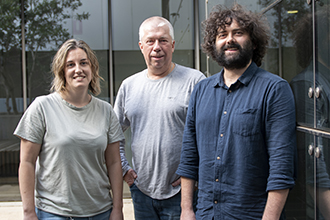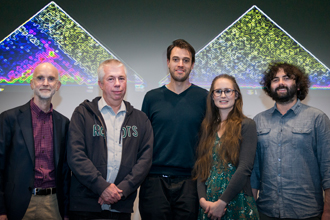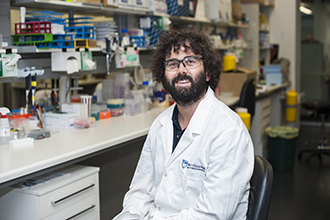Quon S, Johanson TM, Wadhwa R, Faiz A, Flynn A, Anderson GP, Cox AJ, West NP, Menden MP, Allan RS. Technological advances in the search for a CURE for asthma. The Medical Journal of Australia. 2025;223(S10):10.5694/mja2.70084
Tan W, Park J, Venugopal H, Lou J, Dias PS, Baldoni PL, Moon K-W, Dite TA, Keenan CR, Gurzau AD, Lee J, Johanson TM, Leis A, Yousef J, Vaibhav V, Dagley LF, Ang C-S, Corso LD, Davidovich C, Vervoort SJ, Smyth GK, Blewitt ME, Allan RS, Hinde E, D’Arcy S, Ryu J-K, Shakeel S. MORC2 is a phosphorylation-dependent DNA compaction machine. Nature Communications. 2025;16(1):10.1038/s41467-025-60751-z
Berent S, Allan RS. An X‐tra role for NFκB in gene regulation?. Immunology and Cell Biology. 2025;103(3):10.1111/imcb.12850
Lou J, Deng Q, Zhang X, Bell CC, Das AB, Bediaga NG, Zlatic CO, Johanson TM, Allan RS, Griffin MDW, Paradkar P, Harvey KF, Dawson MA, Hinde E. Heterochromatin protein 1 alpha (HP1α) undergoes a monomer to dimer transition that opens and compacts live cell genome architecture. Nucleic Acids Research. 2024;52(18):10.1093/nar/gkae720
Keenan CR, Coughlan HD, Iannarella N, del Fierro AT, Keniry A, Johanson TM, Chan F, Garnham AL, Whitehead LW, Blewitt ME, Smyth GK, Allan RS. Suv39h-catalyzed H3K9me3 is critical for euchromatic genome organization and the maintenance of gene transcription. Genome Research. 2024;34(4):10.1101/gr.279119.124
Milevskiy MJG, Coughlan HD, Kane SR, Johanson TM, Kordafshari S, Chan F, Tsai M, Surgenor E, Wilcox S, Allan RS, Chen Y, Lindeman GJ, Smyth GK, Visvader JE. Three-dimensional genome architecture coordinates key regulators of lineage specification in mammary epithelial cells. Cell Genomics. 2023;3(11):10.1016/j.xgen.2023.100424
Chan F, Coughlan HD, Ruhle M, Iannarella N, Alvarado C, Groom JR, Keenan CR, Kueh AJ, Wheatley AK, Smyth GK, Allan RS, Johanson TM. Survey of activation‐induced genome architecture reveals a novel enhancer of Myc. Immunology and Cell Biology. 2023;101(4):10.1111/imcb.12626
Zhang S, Rautela J, Bediaga NG, Kolesnik TB, You Y, Nie J, Dagley LF, Bedo J, Wang H, Sun L, Sutherland R, Surgenor E, Iannarella N, Allan R, Souza-Fonseca-Guimaraes F, Xie Y, Wang Q, Zhang Y, Xu Y, Nutt SL, Lew AM, Huntington ND, Nicholson SE, Chopin M, Zhan Y. CIS controls the functional polarization of GM-CSF-derived macrophages. Cellular & Molecular Immunology. 2023;20(1):10.1038/s41423-022-00957-z
Chan WF, Coughlan HD, Chen Y, Keenan CR, Smyth GK, Perkins AC, Johanson TM, Allan RS. Activation of stably silenced genes by recruitment of a synthetic de-methylating module. Nature Communications. 2022;13(1):10.1038/s41467-022-33181-4
Johanson TM, Allan RS. Parsing the transcription factors governing T cell immunity. Nature Immunology. 2022;23(1):10.1038/s41590-021-01075-0






